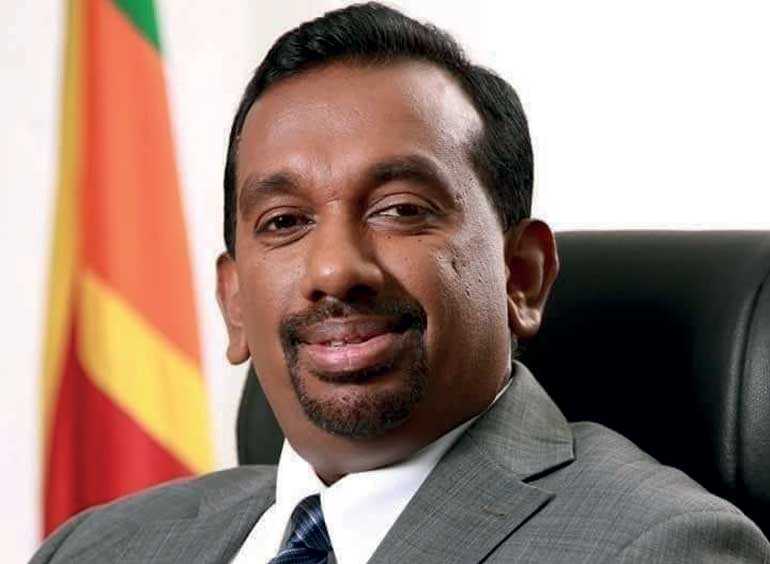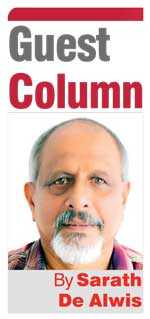Monday Feb 16, 2026
Monday Feb 16, 2026
Tuesday, 7 April 2020 00:59 - - {{hitsCtrl.values.hits}}

Minister Mahindananda Aluthgamage
‘Vada Pitiya’ is the title of the popular political talk show aired weekly by Derana TV network. ‘Argumentative Amphitheatre’ would be the near flawless English construction. ‘Polemical Playpen’ would be a close second. Arguably, it is the most-widely-watched TV talk shop that entices cock-a-hoop politicians of all persuasions.
Last week the program itself and its multitalented anchor made news. 
Mahindananda Aluthgamage – a senior Minister of the current caretaker Cabinet – appearing on the show unleashed a fiery condemnation of a specific community that he alleged carelessly spread the COVID-19 virus in his hill country bailiwick.
Aluthgamage is a politician. He is not an expert on public health. It is reasonable to presume that his knowledge of the disciplines of immunology or epidemiology could be comfortably accommodated on a pinhead. This simple truth escaped the attention of the TV anchor. He did not bother to ask the politico why he did not leave that responsibility in the hands of State officials handling public health.
Despite this slight omission, the TV anchor was the quintessential public policy arbitrator. Upholding the highest traditions of journalism, he interrupted the garrulous politician. “Is it fair to target a specific community?” he asked.
The TV anchor’s dispassionate innocence added further fuel to the Minister’s mock indignation. He accused the ethnoreligious minority of deliberate, wilful flouting of emergency health regulations announced by the Government. Of 20 positive cases detected, 19 were from that community. “Now can we possibly permit such behaviour?” he persisted.
The TV anchor expressed alarm. Identifying a specific group as responsible for the spread of the infection would be unfair and counterproductive, he warned. That warning, however, came after the Minister was given full rein to wax eloquent on his indictment of the hapless community that he targeted. With unabashed venom he derided the behavioural norms of the community he was determined to name and shame.
It was now time for a commercial break. The microphone was still on. The participants after their exhibition bouts quietly relaxed. Then came the coup de théâtre that went viral on YouTube instantly. The TV anchor told the Minister: “Mata dan ganak denna oney oya tika kiyanta dunnanta” [I deserve a reward for letting you release that bit of diatribe].
Readers will note I have avoided naming names except that of the Minister. Subsequent to the faux pas he released another statement reiterating the substance of his earlier outburst. See https://www.youtube.com/watch?v=URS76wlbfuE
Revisiting the psychosis of the jingoist Minister or deciphering the deception of the artful TV anchor is not the purpose of this essay. It has a more pragmatic purpose. Electronic media in Sri Lanka are not subject to any supervision by a regulatory agency. A free debate is good for a democratic society. But presenting personal opinions as facts on the ground needs to be condemned.
In the lonely drift in lockdown land, I cannot dismiss this incident lightly. The politician with his diatribe fingered one of the foulest of wounds. It cannot be left unattended either. The Russian poet Anna Akhmatova tugs at my weary conscience: “As the future ripens in the past, so the past rots in the future – a terrible festival of dead leaves.”
In lockdown land, the terrible festival of dead leaves allows us no respite. A fawning media, electronic and print makes politicians callous and unaccountable.
The TV show is aired by the TV channel that is named after ‘Terra’ – the roman goddess of earth. The cognoscenti of this troubled land know that its brilliant owner creators indeed now parade as they own ‘Terra’ the earth goddess.
The episode of the microphone that wasn’t switched off and the subsequent uproar that failed to take-off has a lesson.
When an implacable crisis hits a society, the fundamental reality of that society is exposed. The exposure, if you care to look, will show the ghastly, gruesome state of nature of that rotten society.
It is that actuality that surfaced when the TV anchor, the Minister and at least one other participant forgot that the microphone was on, permitting the world to be privy to their professional perfidy – the profession of politics and the profession of manufacturing political opinion.
The pandemic crisis will define the times we live in. It will shape the future that awaits us. We are now discovering, in real time where power lies, what people treasure and what people fear. Thanks to the pandemic and the lockdown, we know who has less and who has more. More than that, we know who needs far more than what they already have.
This has happened before. When the black death overwhelmed humankind, we looked for someone responsible. Unable to fight the invisible virus, humans decided on the next best thing. They shut themselves in closed compounds and hounded out ‘undesirables’.
The senior Minster from the hill country who heads the list in his district was retreating to those dark times in history. He is dark in mind.
In fighting the pandemic, words matter. Social distancing is physical distancing while maintaining deep links to social solidarity.
The World Health Organization has issued guidelines to the media. Stick to facts. Don’t report or repeat rumours. Above all do not stigmatise patients.
Poverty of information spurs negative gossip that helps the pestilence to spread. Timely honest information helps to halt it.
This pandemic is scary. What happened at the ‘Vada Pitiya’ reflects that all-pervasive scare of the unknown. We are scared of the unknown. In such irrational fear, we must find someone to blame. It is much more comfortable to replace panic created by an enemy unknown with a villain identified. It is much easier to associate our fears with others.
It has another danger. When minorities are stigmatised as being the ‘other,’ they automatically withdraw into their comfort zones. The WHO has summed the process of ‘othering’ the other: “Stigma can undermine social cohesion and prompt possible social isolation of groups, which might contribute to a situation where the virus is more, not less, likely to spread.”
If people are trying to hide their illness to avoid discrimination, they are less likely to get tested or treated.
We need a consistent, calm, level-headed message. Who will switch on the microphone and give it?